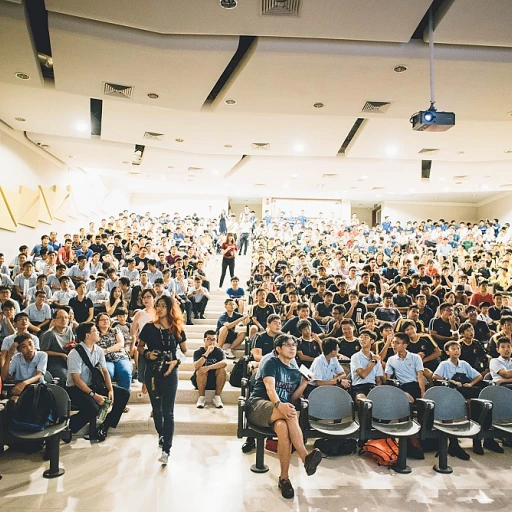
The Evolution of Corporate Culture
Corporate Culture Through the Lens of Change
Corporate culture has undergone significant evolution over the decades. It reflects the shifting priorities and values of organizations as they adapt to a dynamic business environment. Companies have moved from rigid, hierarchical structures towards more fluid, team-oriented approaches that emphasize collaboration and innovation.
As business landscapes transform, so too does the definition of what makes an effective corporate culture. Today, factors like remote work, employee engagement, and organizational psychology are critical components that leaders cannot ignore. Companies are increasingly using data-driven strategies to shape their organizational environments, relying on data analytics to gain insights into employee needs and behaviors.
Adapting corporate culture is not a singular process but an ongoing journey. It demands understanding and incorporation of human elements, aligning them with the strategic talent goals of the organization. This demands effective leadership that can navigate through these changes with a clear vision.
To dive deeper into how corporate culture is evolving and to view it from an executive perspective, consider exploring this insightful resource.
Jeff Smith's Approach to Human Resources
Embracing Data-Driven Strategies in HR
Jeff Smith's understanding of human resources capitalizes on a data-driven approach, seamlessly integrating analytics to enhance employee engagement and performance. As corporate culture evolves, fostering an environment where data is pivotal in making informed decisions allows leaders to remain agile in addressing the ever-changing needs of their workforce. This approach to talent management not only optimizes organizational development but also builds a bridge between company goals and individual talent aspirations.
Moreover, Smith recognizes the importance of effective leadership in cultivating a successful organizational culture. Through strategic talent initiatives, leaders are crucial in shaping the environment that encourages flexibility and adaptation, particularly in the context of remote work. Human-centric leadership development programs serve to enhance relational dynamics among employees, promoting an inclusive work atmosphere.
Acknowledging the challenges present in modern business environments, Smith emphasizes the significance of transparency and trust in corporate practices. This aligns with the principles outlined in building trust in corporate culture, highlighting the need for organizations to prioritize open communication and authenticity as cornerstones of workplace success.
Through these methodologies, Jeff Smith effectively demonstrates how strategic utilization of data analytics combined with robust leadership can play a critical role in nurturing both human resources and business growth.
Challenges in Modern Corporate Culture
Addressing the Complexities of Modern Work Environments
In today’s fast-paced business landscape, corporate culture faces numerous challenges that require innovative solutions. One of the primary issues is the shift towards remote work, which has transformed how companies manage their employees and maintain a cohesive organizational culture. This transition demands a deeper understanding of talent management and employee engagement strategies.
Jeff Smith, a prominent figure in human resources, emphasizes the importance of leveraging creative ways to show staff appreciation to boost morale and productivity. His approach involves utilizing data analytics to gain insights into employee behavior and preferences, allowing for more personalized and effective management strategies.
Another significant challenge is the integration of technology in the workplace. As companies strive to become paper-free, they must also ensure that their digital transformation aligns with their corporate culture. This involves not only adopting new tools but also fostering an environment where employees feel comfortable and supported in using them.
Leadership plays a crucial role in navigating these challenges. Effective leaders, like Jeff Smith, understand the importance of strategic talent development and leadership development to cultivate a resilient and adaptable workforce. By prioritizing these elements, companies can better manage the complexities of modern work environments and maintain a strong organizational culture.
Innovative HR Practices by Jeff Smith
Innovative Strategies in Human Resources
Jeff Smith has been a pivotal figure in transforming how companies approach human resources. His strategies are rooted in a deep understanding of organizational culture and the evolving needs of the modern workforce. By leveraging data analytics, Smith has been able to create a more data-driven approach to talent management, allowing for more informed decision-making processes.
One of the key innovations introduced by Smith is the integration of remote work policies. Recognizing the shift in employee expectations, he has championed flexible work arrangements that not only enhance employee engagement but also contribute to a more inclusive company culture. This approach aligns with the broader trends in corporate culture, where work-life balance and employee well-being are becoming increasingly important.
Smith also emphasizes the importance of leadership development. By investing in effective leadership programs, he ensures that leaders within the organization are equipped to foster a positive organizational culture. This focus on leadership is crucial, as it directly impacts employee morale and productivity.
Furthermore, Smith has been an advocate for a paper-free environment, promoting sustainability and efficiency within the company. This initiative not only reduces waste but also streamlines processes, making it easier for employees to access and manage information.
In summary, Jeff Smith's innovative HR practices reflect a comprehensive understanding of both the challenges and opportunities within modern corporate culture. His approach to human resources is a testament to the power of strategic talent management and effective leadership in shaping a thriving organizational environment.
The Impact of Leadership on Corporate Culture
The Influence of Leaders on an Organization's Culture
A leader's influence on corporate culture is undeniable. It is their vision and actions that shape the organizational environment and promote the values that drive a company. Leadership can set the tone for employee engagement and define the pathways for talent development. Jeff Smith's approach to leadership is rooted in a deep understanding of human resources, as has been previously discussed.
Smith underscores the need for data-driven strategies in leadership. By leveraging data analytics, leaders can gain insights into both employee performance and satisfaction. This approach enables the crafting of more personalized strategies for talent management, enhancing not only productivity but also job satisfaction.
Remote work has further highlighted the crucial role of leaders in maintaining organizational culture. Through effective communication and genuine engagement, leaders can navigate the complexities and benefits that remote work brings. Strategic leadership development, as embodied by Jeff Smith, emphasizes flexibility and adaptability in the face of changing workplace dynamics.
In this evolving corporate landscape, the promotion of a paper-free environment aligns with sustainable business practices that many forward-thinking leaders advocate for. As leaders like Smith explain, sustainability should be intertwined with company culture, ensuring that organizations are responsible not only to their shareholders but to the environment as well.
In conclusion, the role of leadership in the formulation of corporate culture is paramount. Leaders who prioritize strategic talent management and are guided by data analytics create an inclusive and dynamic workplace where both employees and the organization thrive.













